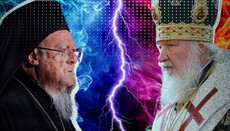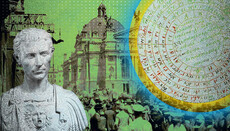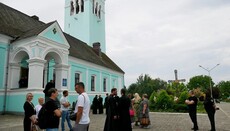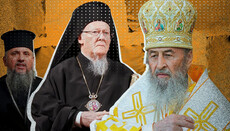To the angel of the Ukrainian Church write...
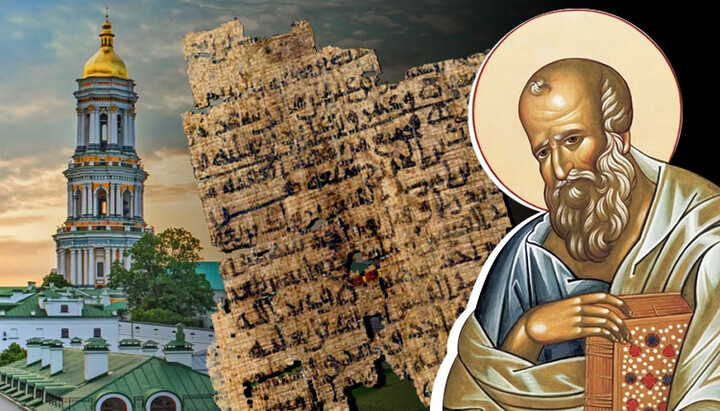
No matter how much the current Ukrainian authorities persecute us, we must remember that Almighty God sees it all and He can end our suffering in an instant.
One can't fully comprehend the depths of what is written in the Apocalypse. But one can attempt to understand what is accessible to us. After all, these words are addressed to us as well.
The second and third chapters of the Book of Revelation are dedicated to the letters to the seven Churches, which the Son of Man commands to be written. These will be discussed further, so it is strongly recommended to read them first.
Throughout almost all times, the holy fathers and interpreters of the Revelation of John the Theologian, those few who dared to write anything about this book (for most did not dare at all), began their reflections with a warning. They emphasized that this book is so mysterious and enigmatic, containing so many meanings and levels of understanding, that interpreting Revelation is nearly impossible
One can only reflect on the contents of this book without claiming exclusivity or correctness in its interpretation. It is impossible to state clearly and definitively: these particular words refer to these specific times or events. Over the past two thousand years, much has happened that fell under the descriptions of the Apocalypse, but every time people were mistaken in their predictions.
Nevertheless, the Apocalypse, like all books of the Holy Scripture, is addressed to people of all times and nations. The letters that the Lord commanded John to send to the seven churches of Asia Minor are not only meant for them but for all Christians. Everyone can see in them words addressed to them personally. We will not attempt to guess which of the seven Asian churches today’s Ukrainian Church most resembles. Instead, it is better to consider what useful lessons we can draw from each message. We will try to find something common in the messages to the seven Churches. And this will certainly relate to us.
The first layer of understanding the messages to the seven Churches is that the Apostle John is commanded to write letters to the leaders of the seven Christian communities in Asia Minor, which he founded and for which he had special care. These communities found themselves in different external circumstances and spiritual states. Some of them receive praise, others – rebuke. A fairly common opinion is that the letters are not merely about specific congregations, but represent different periods in the history of the Church.
It is worth noting the common feature of all the messages: each of them begins with the Son of Man, holding “in His right hand seven stars” (Rev. 1: 16), listing His Divine qualities:
· “To the angel of the church in Ephesus write: These are the words of him who holds the seven stars in his right hand and walks among the seven golden lampstands…’” (Rev. 2: 1);
· “To the angel of the church in Pergamum write: These are the words of him who has the sharp, double-edged sword…’” (Rev. 2: 12);
· “To the angel of the church in Thyatira write: These are the words of the Son of God, whose eyes are like blazing fire and whose feet are like burnished bronze…’” (Rev. 2: 18)
and so on.
Yes, it reads with great majesty — the scale of what is happening takes your breath away, as does the omnipotence of the One who commands the letters to be written to the seven Churches. But is there something more behind this? Why does the Lord speak of His omnipotence in different words each time? Why does He constantly emphasize that He is the highest power in the entire universe?
The communities of Asia Minor, like all Christians of all times and nations, lived an earthly life full of sorrows and deprivations. Addressing some of them, the Lord says: “I know your afflictions and your poverty” (Rev. 2: 9). The Christians of Pergamum are said to live “where Satan has his throne” (Rev. 2: 13). Seeing around them hostility, sorrows, deceit, and other evil, Christians sometimes murmur against God: why does He not protect those who believe in Him if He is omnipotent? Why does He not deliver His faithful from sorrows and even death? When one sees the triumph of evil and injustice all around, it becomes easy to start believing, perhaps subconsciously, that evil is stronger than good.
Unfortunately, many Christians from various social strata, material and official positions prove by their deeds that they do not believe that evil can be overcome by good. Only by another evil. Forced, “right,” “just”, but evil. Not by good.
If deep down we believe that “you can get more with a kind word and a gun than with just a kind word,” then we belong to that category. The Apostle Paul said: “Do not be overcome by evil, but overcome evil with good” (Rom. 12: 21). But very few dare to follow this advice.
By constantly repeating in various forms that God is almighty, the Scripture affirms us in that “He who is in you is greater than he who is in the world” (1 John 4: 4). Even if there is a triumph of evil around, even if nearby is “Satan’s throne”, even if Christians seemingly suffer defeat, still the Son of Man, in whom we believe, is mightier and stronger than evil.
The next message of the Scripture is that the God of Christians is not only greater, stronger, mightier than all, but He also knows about all the circumstances of the lives of those who believe in Him. All the messages to the seven Churches, after listing the Divine qualities, continue with the words: “I know your works.”
Often, as we endure hardships, persecutions, and various sufferings, we are overcome by a feeling of abandonment, a feeling that God has left us, that He does not care about us. But this is not true. God sees not only what is happening around us but also what is happening within us, in our hearts, our thoughts.
“For the word of God is alive and active. Sharper than any double-edged sword, it penetrates even to dividing soul and spirit, joints and marrow; it judges the thoughts and attitudes of the heart. Nothing in all creation is hidden from God’s sight. Everything is uncovered and laid bare before the eyes of him to whom we must give account.” (Heb. 4: 12–13).
In relation to our current situation, this means that no matter how difficult things get for us, no matter how much the current Ukrainian authorities persecute us, no matter how much supporters of the OCU and other “well-meaning” people slander us, we must remember that Almighty God sees all of this and knows everything. He can end our suffering in an instant but does not do so according to His most wise Providence.
We just need to remain faithful to God.
But how to determine that we are faithful to God? To God Himself, and not to traditions, rules, and so on? How to determine that by remaining faithful to the UOC, we remain faithful to the Church of Christ, and not to its visible administrative form?
About those who call themselves apostles but are not
Representatives of the Constantinople Patriarchate, as well as the Ukrainian authorities, suggest that we join the OCU, saying that it is also a Church and there is nothing wrong with uniting with it.
All such proposals, especially those coming from people who call themselves Orthodox Christians (and even Church leaders), should be subjected to verification and investigation. “Beloved, do not believe every spirit, but test the spirits, whether they are of God; because many false prophets have gone out into the world” (1 John 4: 1). In the letter to the Church of Ephesus, the Lord commands to write: “I know your works, your labor, your patience, and that you cannot bear those who are evil. And you have tested those who say they are apostles and are not, and have found them liars…” (Rev. 2: 2).
How can one know where the truth is and where the lie is, where the true pastoral word is, and where the deception is? Sometimes it can be quite difficult to do this, but the Lord gave us a general criterion: “For a good tree does not bear bad fruit, nor does a bad tree bear good fruit. For every tree is known by its own fruit. For men do not gather figs from thorns, nor do they gather grapes from a bramble bush. A good man out of the good treasure of his heart brings forth good; and an evil man out of the evil treasure of his heart brings forth evil. For out of the abundance of the heart his mouth speaks” (Luke 6: 43–45).
More than six years have passed since the creation of the OCU, and the fruits of its activities are already visible. The Constantinople pastors told us that the establishment of the OCU would resolve the problem of the schism in Ukraine. Not only has the problem remained unsolved, but it has become significantly more complicated and deepened. Previously, all local Churches recognized the UOC (Ukrainian Orthodox Church) as the only canonical Church in Ukraine, considering other structures schismatic. Today, the situation has fundamentally changed: the UOC is recognized by everyone as a grace-filled Church, but the Constantinople, Alexandrian, Cypriot, and Greek Churches (or rather, some of their hierarchs) do not recognize its administrative status. Meanwhile, for the other Churches, the OCU remains an uncanonical schism devoid of grace.
They told us that the creation of the OCU would ease conflict in Ukrainian society, calm tensions, and unite everyone. But instead, conflict has increased. The hatred and hostility of OCU supporters toward UOC believers is off the charts. The internet is full of photos and videos of clashes – in Cherkasy, Chernivtsi, and other cities where OCU supporters seized UOC cathedrals. In these scenes, you see bloodied faces of church defenders, beaten priests, weeping parishioners, and their children.
And these are just the most well-known cases caught on surveillance cameras and mobile phones. How many incidents went unrecorded? Tens or even hundreds of times more? In many towns and villages, neighbors who once lived peacefully have become enemies. Professional activists, under the OCU banner, tour villages and terrorize ordinary people, who are guilty only of remaining faithful to their Church.
It even reaches blatant sacrilege: OCU supporters take “enemy” altars out of churches onto the street, throw icons and the Scriptures into the trash, use liturgical texts as toilet paper, pour pig’s blood on church gates, and defecate in the altar.
They told us that the actions of the Constantinople Patriarchate in creating the OCU would lead to the revival of Orthodoxy in Ukraine. But what do we see? The Kyiv-Pechersk Lavra is practically closed to the faithful; it is impossible to venerate the relics of the saints, which are being examined by various embryologists, pathologists, and even veterinarians.
On August 19, another shocking act of sacrilege took place at the Lavra when the reserve staff removed the relics from the caves, took them out of their reliquaries, and performed some unknown manipulations with the saints. Afterwards, the relics were placed on the floor in one of the corridors.
At the Refectory Church of the Lavra, where thousands of people used to come for services before the creation of the OCU, now song and dance performances, cooking shows, and similar events are held. The Lavra, once always filled with worshippers, has suddenly become empty.
The flood of lies and dirty accusations poured onto the UOC has led to people no longer knowing whom to trust, causing many to drift away from the Church.
The fruits of the six years of the OCU’s existence speak eloquently about its true nature. Time itself has tested “those who call themselves apostles but are not”. Therefore, Christians who have remained faithful to the UOC side with truth and righteousness, Christ and His Church.
Standing in the truth for the reward from God
The next point to note is that all the letters to the seven Churches contain a call to remain faithful and stand in the truth, along with the promise of victory and a reward from God.
· “To him who overcomes I will give to eat from the tree of life, which is in the midst of the Paradise of God” (Rev. 2: 7);
· “To him who overcomes I will give some of the hidden manna to eat. And I will give him a white stone, and on the stone a new name written which no one knows except him who receives it.…’” (Rev. 2: 17);
· “He who overcomes shall be clothed in white garments, and I will not blot out his name from the Book of Life; but I will confess his name before My Father and before His angels…’” (Rev. 3: 5)
and so on.
What is this victory? Whom or what must be conquered to inherit the promises? The answer is found in the letter to the angel of the Laodicean Church. This Church received the sternest words of all seven letters:
“I know your works, that you are neither cold nor hot. I could wish you were cold or hot. So then because thou art lukewarm, and neither cold nor hot, I will spue thee out of my mouth. Because you say, ‘I am rich, have become wealthy, and have need of nothing’ – and do not know that you are wretched, miserable, poor, blind, and naked” (Rev. 3:15–17).
In apostolic times, Laodicea was a prosperous city – rich and well-developed. Accordingly, the Christian community there was known for its outward splendor. But “what is highly valued by people is detestable in God’s sight” (Luke 16:15).
To this outwardly prosperous but spiritually poor community, the Lord says:
“To him who overcomes I will grant to sit with Me on My throne, as I also overcame and sat down with My Father on His throne.” (Rev. 3:21). He holds up His own victory as an example. Outwardly, Christ suffered defeat – not only did He not triumph by worldly standards, He was executed by the most shameful death, and His disciples fled. But He conquered! He conquered by choosing not to ask the Father to send legions of angels to destroy His enemies. He conquered by not coming down from the Cross, despite the taunts:
“Save yourself! If you are the Son of God, come down from the cross... If you are the King of Israel, come down now from the cross, and we will believe you; He trusted God; let Him rescue Him now if He delights in Him...” (Matt. 27:40–43).
The victory spoken of by “the one who has the sharp two-edged sword…” (Rev. 2:12) is not an external victory, nor is it simply the end of persecutions. It is faithfulness to God and endurance to the very end of all the sufferings that the Lord allows us to experience and from which He does not always quickly deliver us. All that is required of us is to endure and remain faithful to Him.
“Do not fear any of those things which you are about to suffer. Indeed, the devil is about to throw some of you into prison, that you may be tested, and you will have tribulation ten days. Be faithful until death, and I will give you the crown of life” (Rev. 2:10). The phrase “ten days” symbolizes the brevity of suffering. And even if our trials seem long, compared to eternity they are truly brief.
I would like to conclude these reflections with the words of Christ:
“Will God not bring about justice for his chosen ones, who cry out to him day and night? Will he keep putting them off? I tell you, he will see that they get justice, and quickly. However, when the Son of Man comes, will he find faith on the earth?” (Luke 18:7–8).
Today’s persecutions will one day end. Ukrainian Christians will be delivered from their current sufferings. They will breathe freely and with relief.
But will Christ find faith in us? Faithfulness to His commandments? Love for God and neighbor? Love for our enemies? Or will we become embittered in response to the evil done to us? Will we answer hatred with hatred, which is fed by those “kind” people? Will we become indifferent, lukewarm? We must remember that Christ’s victory is nothing like what is commonly understood in this sinful world.
